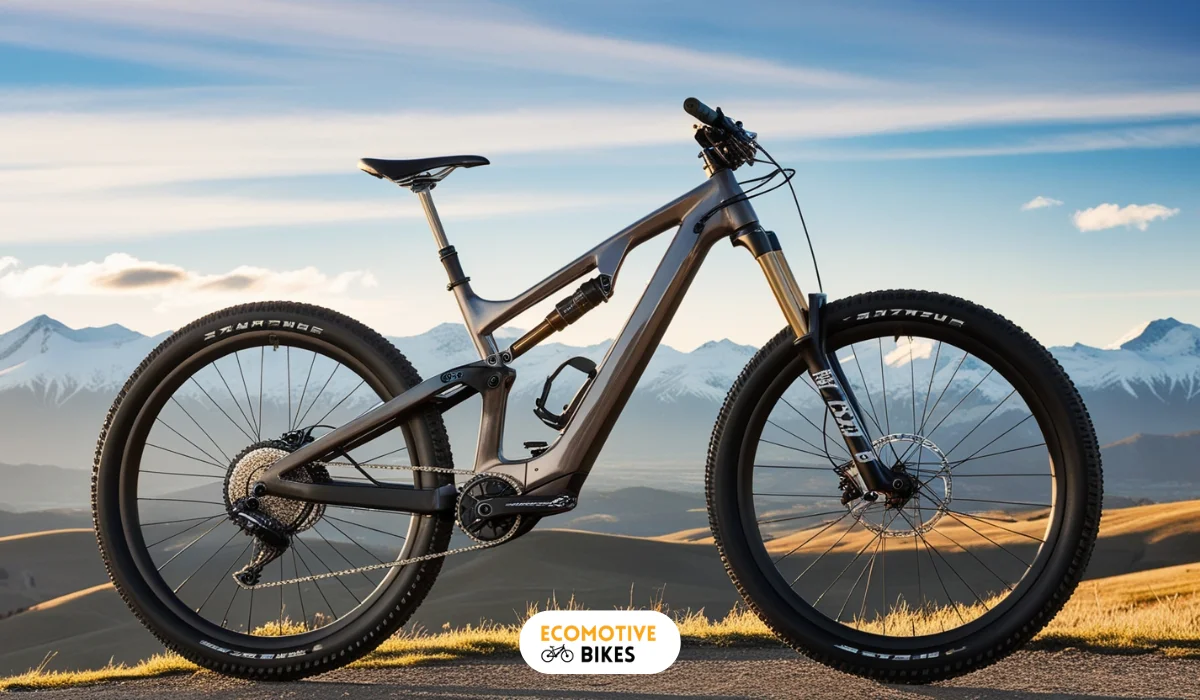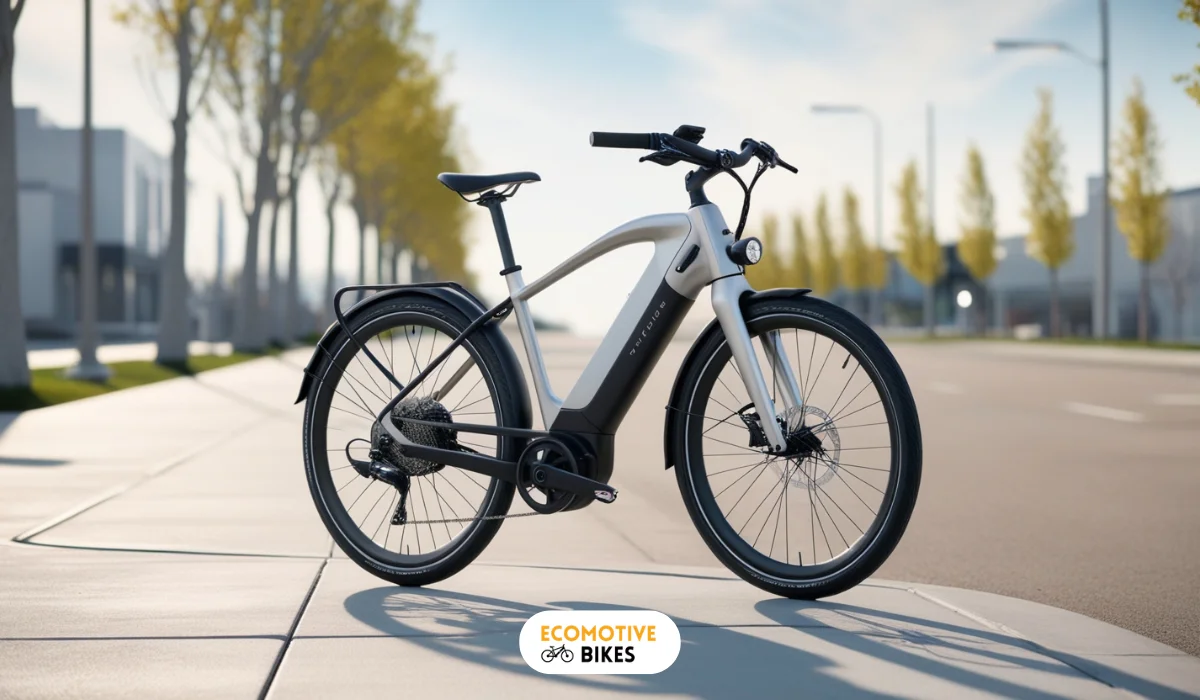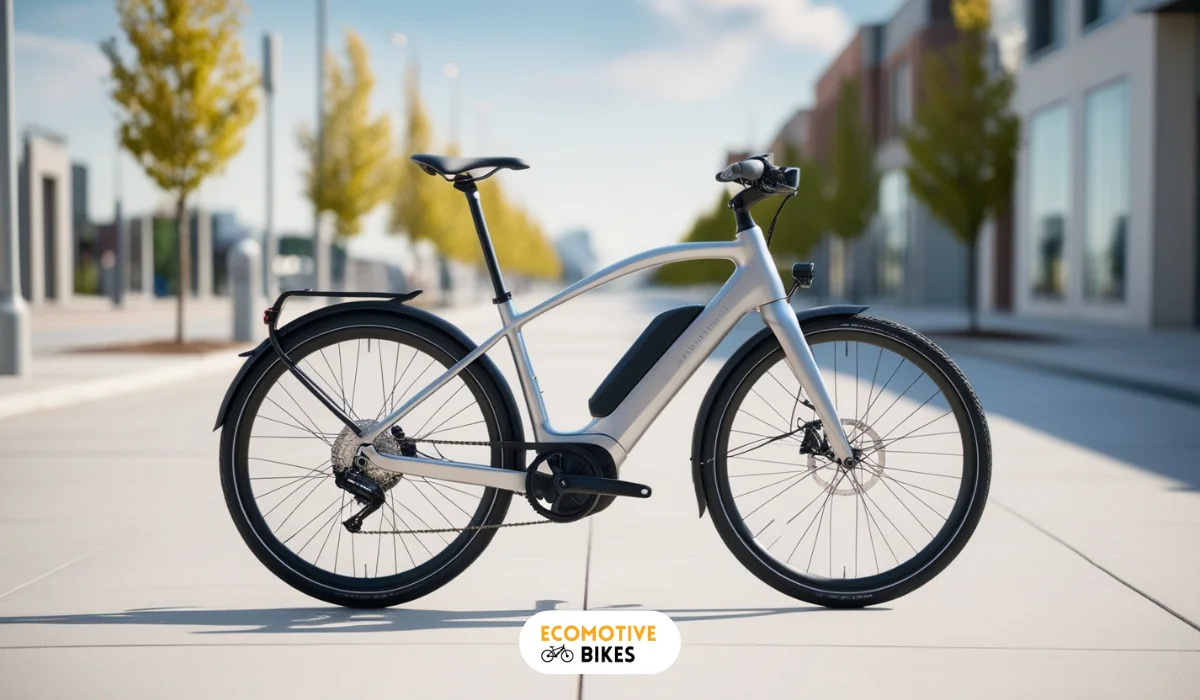Why my ebike brakes squeaking and how to resolve it?
Wondering why your ebike brakes squeaking? Learn common causes like dirt, misalignment, and worn pads, and find solutions to resolve brake noise.
Table of Contents
Related Articles:
Squeaky e-bike brakes can be both annoying and a sign that something isn’t quite right with your braking system. Whether you’re riding in wet conditions or have accumulated dirt on your brake pads, this noise is often a result of several common issues.
In this blog post, we’ll explore the main reasons why my ebike brakes squeaking and offer practical solutions to help you get rid of the noise for a smoother, quieter ride.
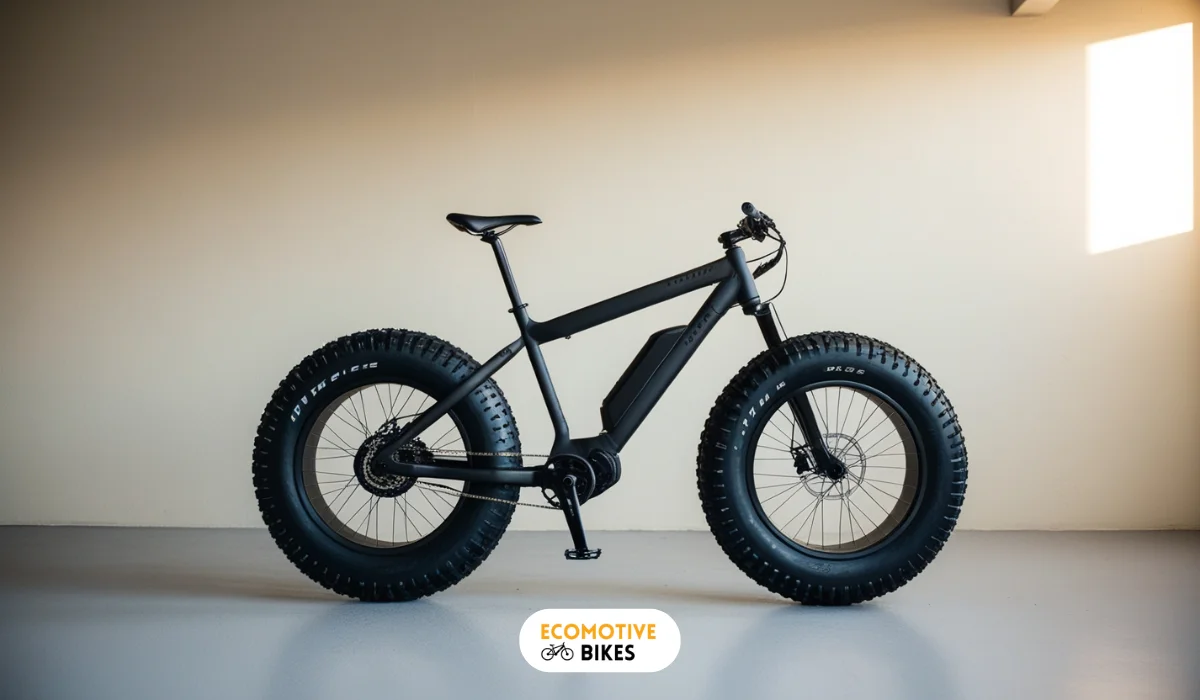
Why do my e-bike brakes squeak?
Squeaky brakes are a frequent issue for cyclists, but the good news is that the underlying causes are often easy to fix. Understanding the potential reasons behind the noise will help you restore your bike’s braking performance quickly and safely.
It’s crucial to address squeaky brakes early. Ignoring the problem can lead to reduced braking efficiency, which might increase the risk of accidents.
Although specific issues might vary depending on the type of braking system you have, several common causes are often behind noisy brakes. Here are the most typical reasons your bike brakes might squeak:
7 Common causes of squeaky brakes and their solutions
1. Dirty or greasy components: One of the most frequent reasons for squeaky brakes is contamination of the brake pads, rotors, or rims with dirt, grease, or oil. When these substances accumulate, they can cause the brakes to emit a high-pitched squeal as the pads try to grip the surface. Mud or road debris can also lead to similar sounds.
Solution: Clean the affected parts thoroughly with a degreaser or a brake cleaner to remove any contaminants and restore proper braking performance.
2. Misalignment of brake pads: If the brake pads are not perfectly aligned with the rim (in rim brake systems) or the rotor (in disc brake systems), they might make uneven contact, causing a squealing noise. Misalignment can happen due to improper installation, regular wear, or after repairing a flat tire.
Solution: Adjust the brake pads to ensure they make even contact with the rim or rotor. This will not only stop the noise but also improve braking efficiency.
3. Bent rotor (for Disc Brakes): In disc brake systems, a bent or warped rotor can cause the brake pads to rub against it unevenly, leading to squeaking, squealing, or a “pinging” noise. A slight bend may not always be visible to the naked eye, but it can cause consistent noise while riding.
Solution: Inspect the rotor for any bends and either straighten it carefully with a rotor truing tool or replace it if the damage is severe.
4. New brake pads: Brand new brake pads often need time to settle in, or “bed in,” before they perform optimally. During the bedding-in process, new pads might make some noise as they wear down to form an even surface with the rotor or rim.
Solution: Give your new pads some time to bed in by riding and braking normally. If the noise persists after this period, you may need to clean or align the pads.
5. Improperly set-up brakes: Poorly adjusted brakes can vibrate when applied, which creates a loud screeching or squealing noise. This is more common when the pads aren’t mounted securely or are loose within their calipers.
Solution: Check the brake setup to ensure everything is properly fastened, and the pads are secure. Re-torque bolts and adjust cable tension if necessary.
6. Moisture on rotors or rims: Water from rain, dew, or condensation can cause squeaking in both rim and disc brakes. Moisture can create a temporary squeal, especially when it combines with road grime, creating a thin layer of rust or reducing the pad’s grip.
Solution: Dry the affected components by riding for a short while, applying the brakes occasionally to help burn off moisture. You can also clean and dry the parts manually if needed.
7. Worn or damaged brake components: Squeaking may also signal that your brake pads or rotors are worn down or damaged. As pads wear, they can become glazed, hard, and less effective, leading to squealing sounds when they struggle to grip the surface properly.
Solution: Inspect the brake pads and rotors for signs of wear, glazing, or damage. Replace worn or damaged components to eliminate noise and ensure safe braking.
Here is a video guide on how to resolve ebike squeaking issues:
How to stop bike brakes from squeaking
Now that you’re familiar with the differences between rim and disc brakes, you can more easily identify the cause of squeaky bike brakes.
Before jumping into any major fixes, it’s worth starting with the basics. Often, squeaky brakes are simply the result of dirt or contamination, which can be quickly resolved with a good cleaning. However, if the issue persists, there are additional steps you can take to resolve more complex problems.
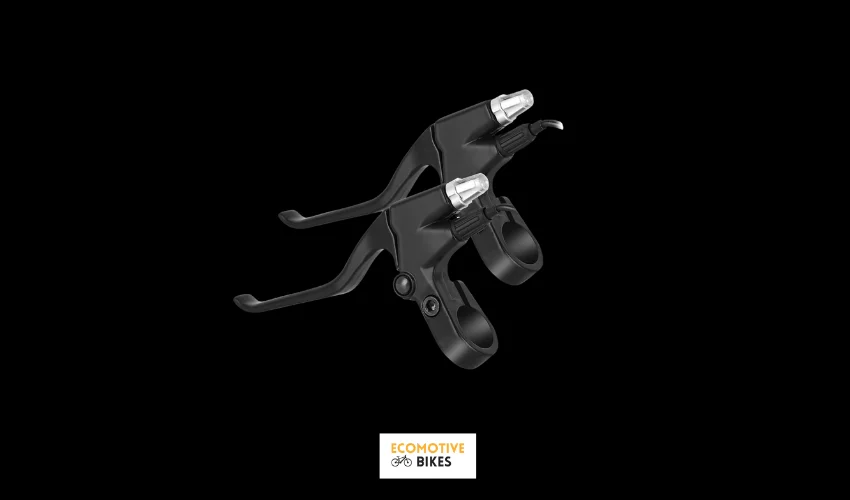
Related: Types of e-bike brakes
A) How to stop squeaky rim brakes?
Step 1: Check for dirt or contamination
The first thing to check is whether your brake pads and rims are dirty. Dirt, grit, and debris can become lodged under your brake pads as they wear down, causing them to lose their grip on the rim. This leads to decreased braking power and the infamous squeal.
Additionally, you should inspect the wheel rims and calipers. Dirt on these surfaces can also affect brake performance and cause noise as the brakes work harder to slow your bike.
How to clean your rim brakes:
- Remove the wheels from your bike.
- Inspect the brake pads, rims, and surrounding areas for dirt and debris.
- Use a cloth to gently remove larger particles and any obvious dirt.
- For tougher grime, use a fresh cloth and an acid-free bike cleaner to wipe down the brake pads and rims.
- Re-attach the wheels after cleaning.
- Test the brakes to see if the squeak has been eliminated.
Note: If the residue seems greasy or oily, you may need to use a degreaser to clean the area properly. Contamination from chain lube is a common cause of brake squeaking, especially if excess lubricant drips onto the brakes.
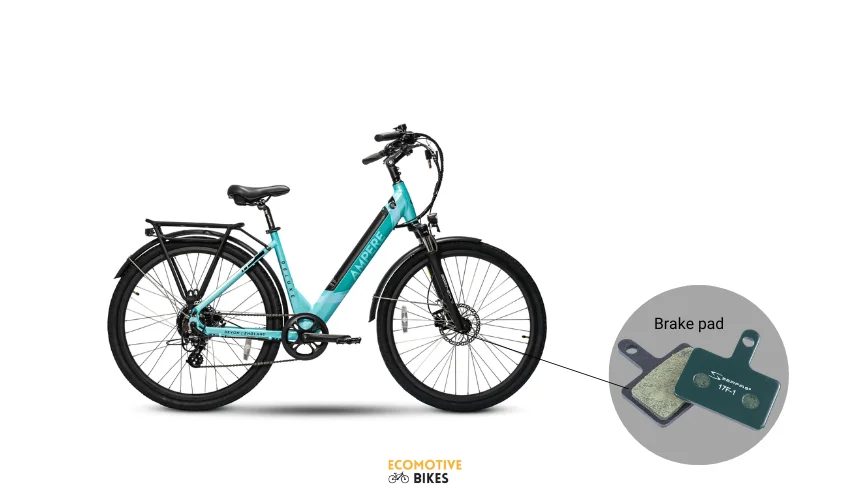
Step 2: Inspect the brake alignment
Misaligned brake pads can be another cause of noisy braking. To check for alignment issues, apply the brake and see if the pads make even contact with the rim. If they are off-center, they can create squealing sounds as they struggle to stop the wheel effectively.
You can fix this by loosening the mounting bolts, adjusting the brake pads, and repositioning them for better contact with the rims. Another helpful method is to “toe-in” the brake pads. Normally, brake pads are installed parallel to the rims, but by angling them slightly—so the front of the pad touches the rim first—you can reduce vibration and noise.
How to toe-in your brake pads:
- Place a thin piece of cardboard between the rear of the brake pad and the rim.
- Squeeze the brakes to hold the cardboard in place.
- Using an Allen key, loosen the caliper bolts slightly to reset the brake pad position.
- Retighten the bolts while keeping the pads at the adjusted angle.
- Test your brakes to ensure the squeak is gone.
Step 3: Inspect the brake pads for wear
If cleaning and adjusting the alignment doesn’t resolve the squeaking, the issue might be worn brake pads. Over time, pads become glazed, hardened, or worn down, leading to decreased performance and squealing.
Take a close look at the condition of the pads. If they appear worn or glazed, it’s time to replace them. When replacing brake pads, it’s important to choose pads that match the material of your wheel rims, as this can significantly impact how well they perform and how quiet your braking is.
Replacing brake pads should be the final step after trying other solutions, but if your pads are worn out, a new set will likely fix the issue for good. After replacing them, regular cleaning and maintenance should prevent squeaky brakes from recurring.
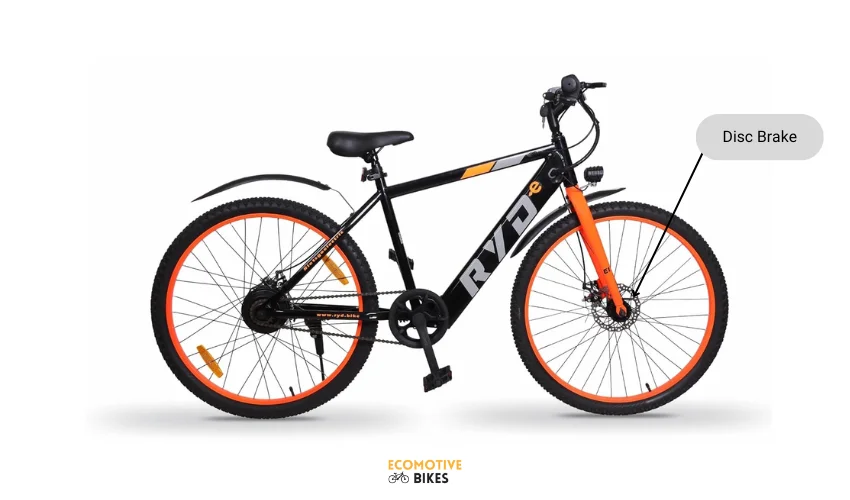
B) How to stop disc brakes from squeaking
When it comes to disc brakes, the design makes them less prone to picking up dirt compared to rim brakes, but they are still vulnerable to contamination and other issues that can lead to squeaking. If you’re hearing a squeak from your bike’s disc brakes, follow these steps to troubleshoot and resolve the issue.
Step 1: Check for dirt or contamination
Disc brakes are generally better at resisting dirt because of their positioning. However, contamination can still occur, particularly from excess chain lubricant that finds its way onto the rotors or pads.
To clean contaminated disc rotors:
- Use a disc brake cleaner and a clean cloth.
- Spray the cleaner directly onto the rotor.
- Wipe away any oil or residue with the cloth.
If the brake pads are contaminated:
- Remove the wheels from your bike.
- Carefully take out the brake pads.
- Check the pads for any signs of oil or grease.
- If the pads are oily, you can try applying mud to them, reattaching the wheels, and braking hard. Sometimes, this can clean off the contamination.
- If this method doesn’t work, you might need to heat the pads to burn off the oil using a vice and a blow torch. Alternatively, you may need to replace the pads if the contamination is severe.
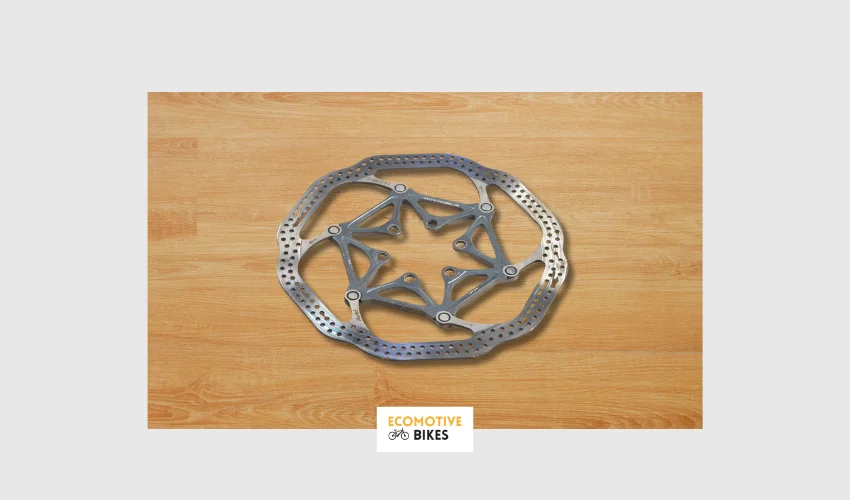
Step 2: Check for glazing on pads or rotors
If the pads and rotors aren’t contaminated but are still causing squeaking, they may have become glazed over time. Glazing occurs when the surfaces become too smooth due to frequent braking, reducing their ability to grip.
To de-glaze the rotors:
- Wipe the rotor with disc brake cleaner and a cloth.
- Use 150-grit sandpaper to gently rub the surface in circular motions.
- Change to an up-and-down sanding motion, followed by side-to-side movements.
- Continue until the surface feels rough again. This will help prevent future glazing.
To de-glaze the brake pads:
- Place 150-grit sandpaper on a flat surface.
- Hold the pads face-down and rub them against the sandpaper until the surface becomes rough again.
Step 3: Check the alignment of the calipers
Caliper misalignment is another potential cause of squeaking disc brakes. If the calipers are not evenly spaced on either side of the rotor, they may cause rubbing and noise.
How to check and adjust caliper alignment?
- Place your bike on a stand and spin the front wheel.
- If the wheel spins freely and the rotor is evenly positioned between the brake pads, the calipers are aligned correctly.
- If the wheel doesn’t spin freely, or there is uneven space on either side of the rotor, the calipers are misaligned.
- Loosen the mounting bolts that hold the calipers.
- Apply the brakes sharply and hold them while tightening the bolts again.
- Repeat the process for the rear wheel if necessary.
Step 4: Check for bent rotors
Bent rotors are a common issue that can cause your disc brakes to squeak. If your rotors aren’t straight, they can rub against the brake pads, causing noise and reducing braking efficiency.
How to check for bent rotors?
- Place your bike in a stand and spin the front wheel.
- Watch how the rotor moves between the calipers. If it wobbles or appears bent, this is likely the cause of the squeak.
To straighten a bent rotor:
- Take an adjustable wrench and fit it to the width of the rotor.
- Gently apply pressure to the bent area and try to push it back into its original position.
If the rotor is too bent and can’t be straightened, you’ll need to replace it with a new one.
Faq’s: Squeaky e-bike brake
Why are my e-bike brakes squeaking?
E-bike brakes often squeak due to dirt, moisture, or oil contamination on the brake pads or rotors. The noise can also be caused by misaligned brake calipers or worn-out brake pads. Cleaning the rotors and pads or adjusting the brake system usually resolves the issue.
How can I stop my e-bike brakes from squeaking?
To stop squeaking, clean the brake rotors and pads with isopropyl alcohol or a brake cleaner. Make sure the calipers are properly aligned, and check that the brake pads aren’t worn out. If cleaning doesn’t help, you might need to replace the brake pads.
Do squeaky brakes affect the performance of my e-bike?
Yes, squeaky brakes can indicate reduced braking efficiency. Contaminated or misaligned brakes might not grip as effectively, increasing your stopping distance. It’s essential to address the noise to ensure your brakes are functioning properly and safely.
Can weather cause my e-bike brakes to squeak?
Yes, wet or humid conditions can cause e-bike brakes to squeak. Moisture can reduce friction between the brake pads and rotors, leading to noise. However, the squeaking should subside once the brakes dry off. If it persists, it may indicate contamination or wear.
Are my e-bike brake pads worn out if they squeak?
Squeaking can be a sign of worn-out brake pads, but it’s not always the case. You should inspect the pads for wear; if they’re thin or uneven, it’s time to replace them. If the pads are still in good condition, the squeaking might be due to contamination or alignment issues.
What should I clean my e-bike brakes with?
You should use isopropyl alcohol or a dedicated brake cleaner to clean the brake pads and rotors. Avoid using water, lubricants, or household cleaners, as they can further contaminate the brake components and worsen the squeaking.
Can new brake pads squeak on my e-bike?
Yes, new brake pads may squeak as they bed in with the rotors. This noise should go away after some usage once the pads and rotors establish proper contact. If the noise persists beyond the break-in period, check for alignment or contamination issues.
Are noisy e-bike brakes dangerous?
Squeaky brakes are not necessarily dangerous, but they can indicate underlying issues like contamination, misalignment, or wear. If left unaddressed, these issues can reduce braking performance, making riding unsafe. It’s important to inspect and fix squeaking brakes promptly.
Do disc brakes on e-bikes squeak more than rim brakes?
Disc brakes can be more prone to squeaking than rim brakes, especially when wet or contaminated. However, proper maintenance and alignment of disc brakes usually prevent excessive noise. Rim brakes may also squeak, but the causes and solutions are similar.
Can e-bike brake rotors be damaged from squeaking?
Squeaking itself doesn’t damage rotors, but if the noise is due to contamination or misalignment and left unresolved, it can lead to uneven wear or scoring on the rotors. Regular cleaning and checking for alignment can help prevent long-term damage.
Final words: Why are my ebike brakes squeaking?
In conclusion, squeaky e-bike brakes can be caused by factors such as dirt, moisture, misaligned components, or worn-out brake pads. Regular cleaning, adjusting the brake alignment, and replacing the pads when necessary can significantly reduce or eliminate the noise.
By addressing these issues promptly, you’ll not only enjoy a quieter ride but also ensure your e-bike’s braking system remains in optimal condition for safety and performance. Find more useful articles on e-bike accessories.

